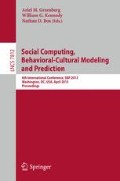Abstract
This paper uses our previously created agent-based model to study the optimal way of allocating parent training resources to address unmet child need, a measure of child maltreatment. We consider parent training resource allocation prioritization based upon: a family’s own resources and the resources they have access to through their social network. Simulation results show that when targeting a community with a parent training intervention program, ignoring heterogeneity within a community is a mistake. This work demonstrates the utility of the developed agent-based model and suggests that child maltreatment research can benefit from a complexity science approach.
Access this chapter
Tax calculation will be finalised at checkout
Purchases are for personal use only
Preview
Unable to display preview. Download preview PDF.
References
The Future of Children. Preventing Child Maltreatment 19(2) (Fall 2009)
Hussey, J.M., Marshall, J.M., English, D.J., Knight, E.D., Lau, A.S., Dubowitz, H., Kotch, J.B.: Defining maltreatment according to substantiation: distinction without a difference? Child Abuse & Neglect 29(5), 479–492 (2005)
National Data Archive on Child Abuse and Neglect, Cornell University, National Survey of Child and Adolescent Well-Being (NSCAW): General Release Version, Appendix - Vol. III (August 2008)
Hu, X., Puddy, R.: Cognitive modeling for agent-based simulation of child maltreatment. In: Salerno, J., Yang, S.J., Nau, D., Chai, S.-K. (eds.) SBP 2011. LNCS, vol. 6589, pp. 138–146. Springer, Heidelberg (2011)
Hu, X., Puddy, R.W.: An agent-based model for studying child maltreatment and child maltreatment prevention. In: Chai, S.-K., Salerno, J.J., Mabry, P.L. (eds.) SBP 2010. LNCS, vol. 6007, pp. 189–198. Springer, Heidelberg (2010)
Prinz, R.J., Sanders, M.R., Shapiro, C.J., Whitaker, D.J., Lutzker, J.R.: Population-Based Prevention of Child Maltreatment: The U.S. Triple P System Population Trial. Prevention Science 10(1), 1–12 (2009)
Sanders, M.R., Markie-Dadds, C., Turner, K.M.T.: Theoretical, scientific and clinical foundations of the Triple P – Positive Parenting Program: A population approach to the promotion of parenting competence. Parenting Research and Practice Monograph 1, 1–21 (2003)
Author information
Authors and Affiliations
Editor information
Editors and Affiliations
Rights and permissions
Copyright information
© 2013 Springer-Verlag Berlin Heidelberg
About this paper
Cite this paper
Keller, N., Hu, X. (2013). Parent Training Resource Allocation Optimization Using an Agent-Based Model of Child Maltreatment. In: Greenberg, A.M., Kennedy, W.G., Bos, N.D. (eds) Social Computing, Behavioral-Cultural Modeling and Prediction. SBP 2013. Lecture Notes in Computer Science, vol 7812. Springer, Berlin, Heidelberg. https://doi.org/10.1007/978-3-642-37210-0_2
Download citation
DOI: https://doi.org/10.1007/978-3-642-37210-0_2
Publisher Name: Springer, Berlin, Heidelberg
Print ISBN: 978-3-642-37209-4
Online ISBN: 978-3-642-37210-0
eBook Packages: Computer ScienceComputer Science (R0)

